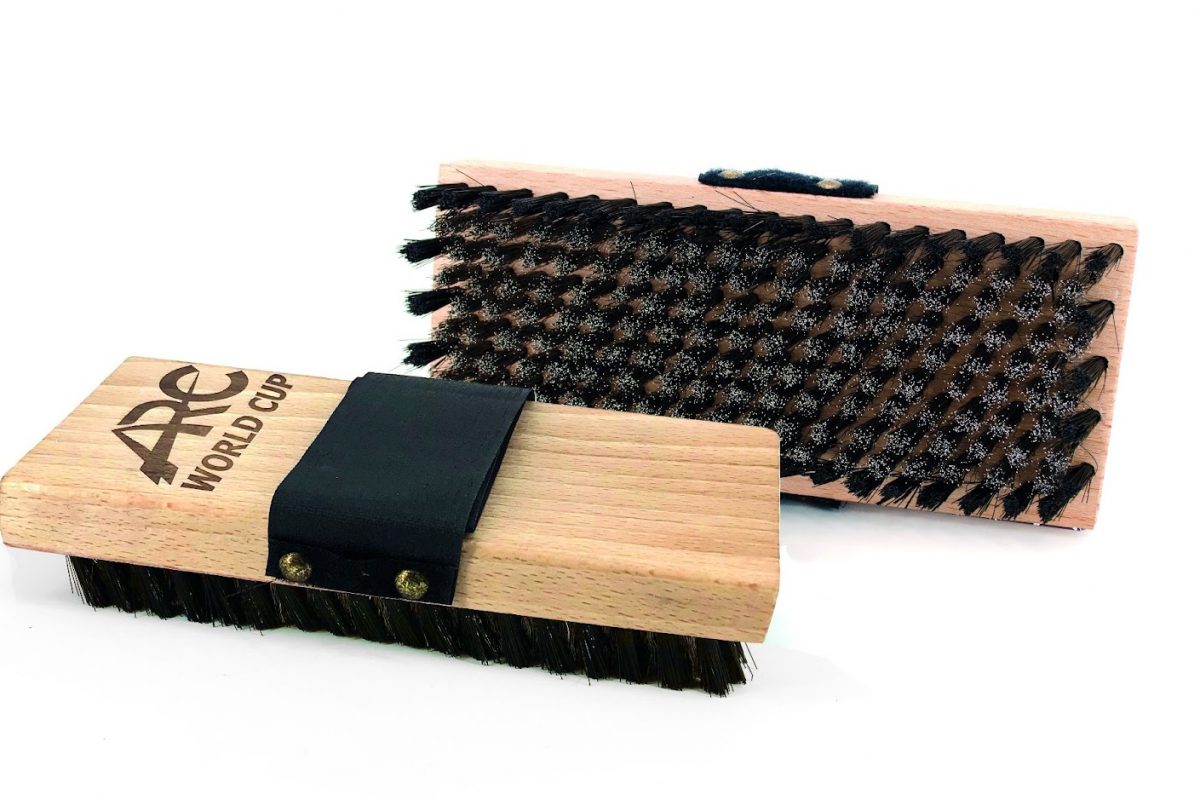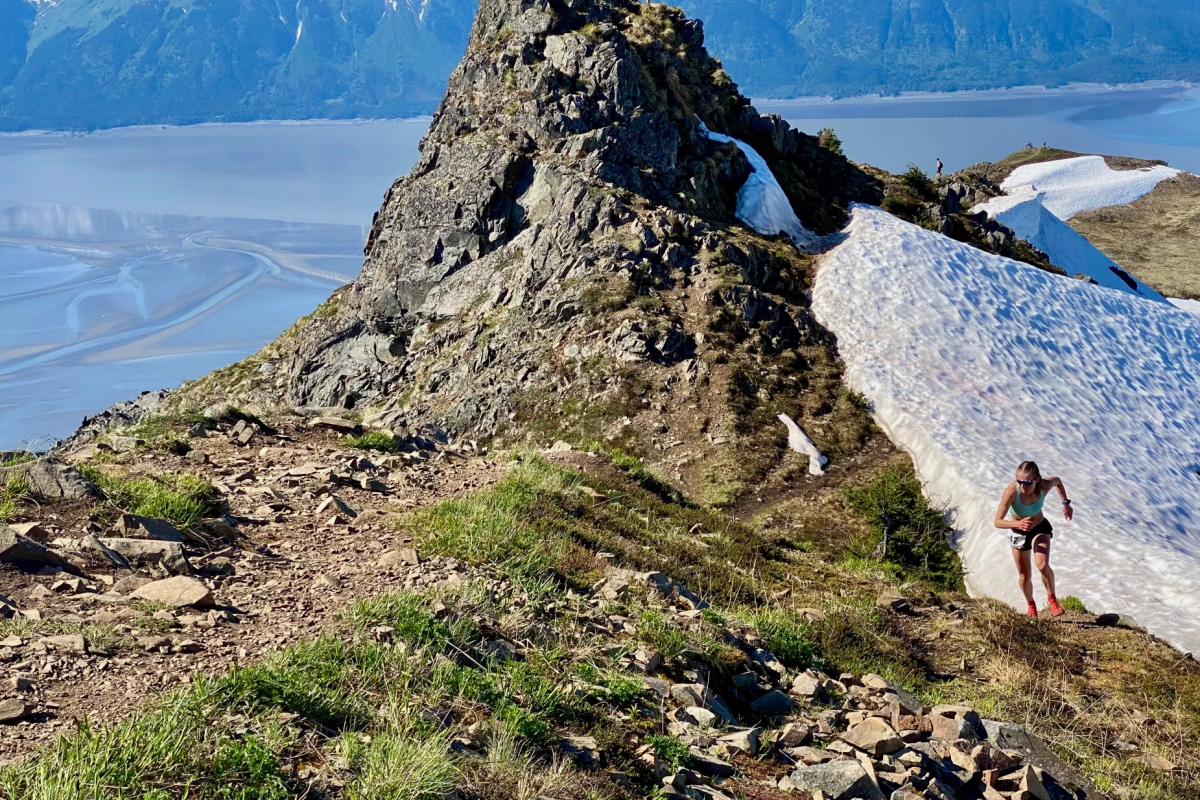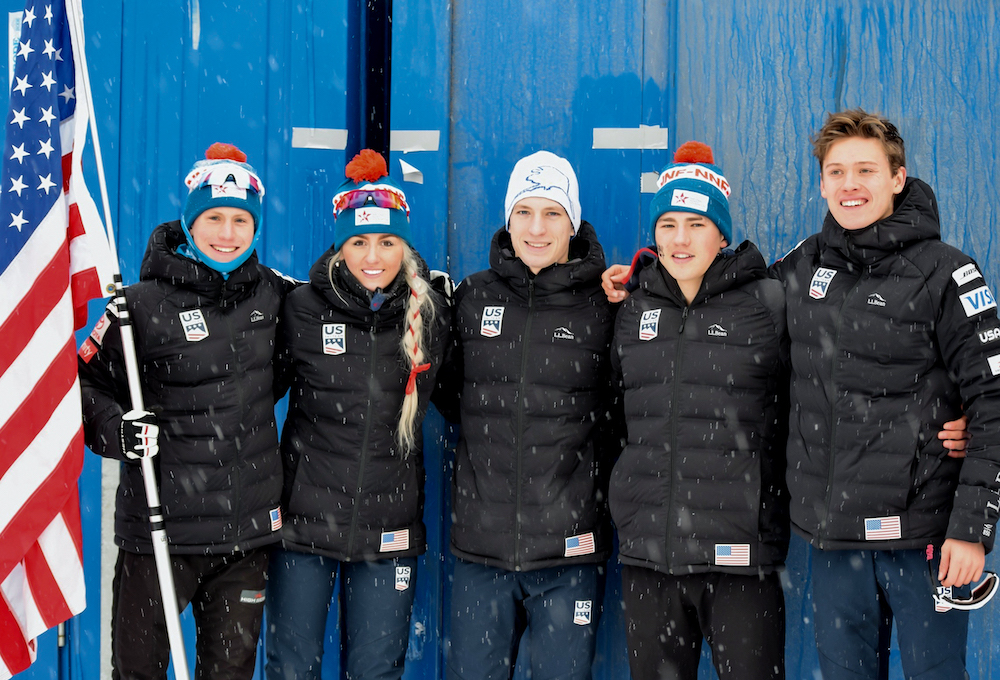
This summer, the U.S. Ski Team announced that it had hired Greta Anderson as the new Development Team Coach. FasterSkier caught up with Anderson on the afternoon of the official announcement to delve deeper into her coaching philosophy, precise job description, and only sort of tongue-in-cheek plans for world domination.
Anderson’s hire was widely praised by both current and former athletes. Here’s Luke Jager, who’s known Anderson for nearly a decade starting in Alaska junior skiing and is currently a member of the USST Development Team, or D-Team: “Super stoked. We have come through the sport together so fired up to get to keep working with her!”
Here’s Gus Schumacher, now on the USST A-Team, who ascended the Alaska junior skiing ranks alongside Jager: “I think she’ll be good at bringing knowledge from a lot of different clubs, camps, and backgrounds to the national team pool. She’s been with [Alaska Winter Stars] recently, but has also been with APU and Crested Butte, as well as doing a bunch of REGs and World Juniors trips. Also it’s always good to get a female perspective in that currently disproportionately male area. She’s a good leader, and I think she’ll be really good in that position.”
And here’s fellow A-Team skier Hailey Swirbul, who was first coached by Anderson many years ago as a junior in Colorado: “I know that Greta has put in the time and work to gain valuable skills that will really help the D-team! She has been on so many international trips and coached at all levels to really develop as a leader and coach. I’m super excited that she will be part of the U.S. staff!”
So the athletes are excited. What does Anderson think about this job, and what parts of her background have prepared her for this position? Anderson spoke with FasterSkier at a west Anchorage playground in early June, a one-minute rollerski away from her childhood home, while planes from the nearby international airport intermittently roared overhead and a reporter’s children patiently entertained themselves on play structures.
Two quick disclosures here: One, Anchorage skiing is a small town. Greta was my coach with APU Masters from 2014–2015, and has remained a close personal friend since. She has listed me as a reference on her applications for several coaching positions over the past few years, though not for this particular one (and so far as I know, I had nothing to do with her being hired for this job). Two, the questions in this interview have been expanded from what I originally asked, so that they will provide more information and better function as transitions in a standalone article. The answers have been lightly edited for syntax and clarity.
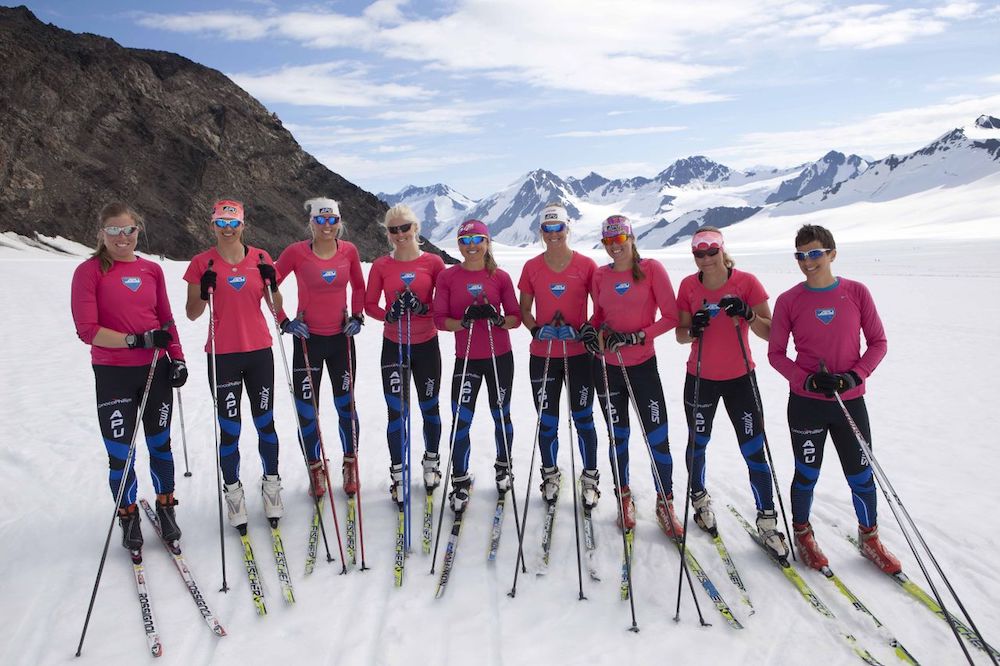
Let’s start with your background. I know that you’re from here; you attended Service High School and skied for Alaska Winter Stars, then went to Alaska Pacific University, where you skied for the APU University Team and won the Tour of Anchorage. You graduated with a B.A. in Counseling Psychology. Am I leaving anything out – did you do anything else before you began coaching the Masters and Devos with APU?
That was my first get-my-feet-wet-in-coaching experience. And what happened was, it was springtime, I think in my junior year, and I hurt my back in the gym. And I said to Erik Flora, ‘I am going to take a break because my back is injured.’ And he said, ‘Well, why don’t you coach a little bit’, and I said, ‘Okay.’
And like so many people who do sports, I’m not good at moderation, and I slippery-sloped into a lot of coaching. And then my back got a little better. I was working with Charlie Renfro as the Devo coach at that time, and then Dylan Watts was the Masters coach at that time, and he was going to phase out in a year. And I enjoyed it a ton. And so then Erik was like, ‘Are you going to come back to racing.’ And I said, ‘No, I kind of love this. I think I wanna do this.’ So then I kept doing it.
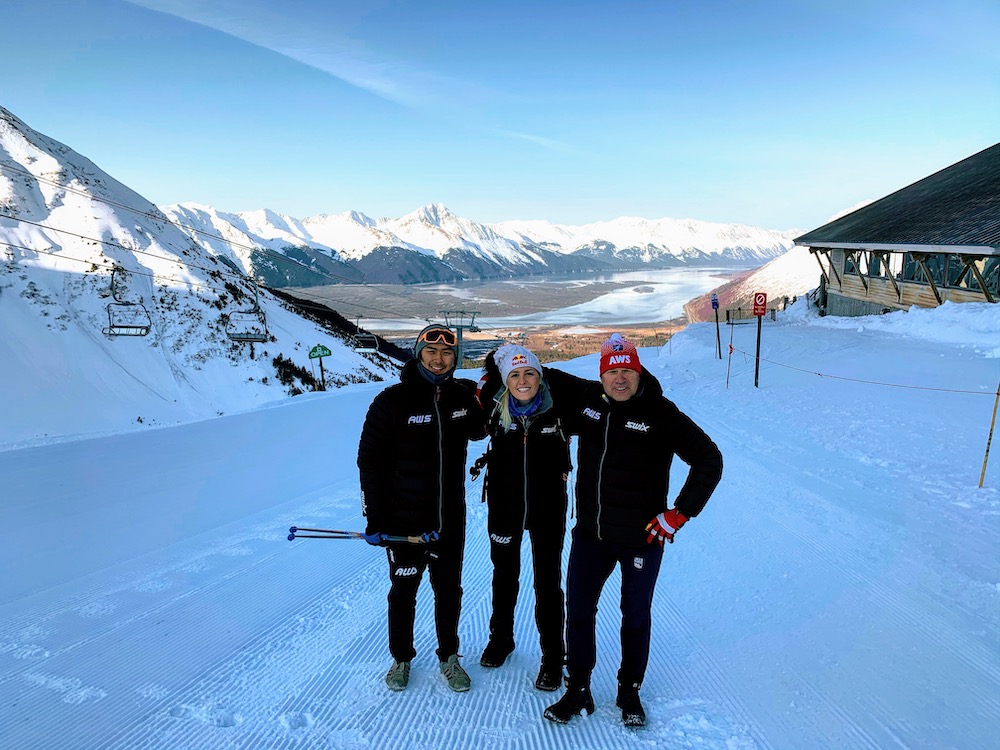
So one year at APU begat several years with Steamboat Springs Winter Sports Club, and a brief stint with Crested Butte Nordic, before you ultimately came back home to Anchorage and Alaska Winter Stars, this time as a coach. And you must have been pretty good at this, because before too long you were at World Juniors with a front-row seat for a spate of breakthrough American performances. Which World Juniors were you at, and what was your official role at them?
I was at two, Lahti and Oberwiesenthal [in 2019 and 2020]. My first year was as a wax tech, my second year coaching – but those are float roles, right? It’s like, what do you need to do on race day? What gaps need to be filled? You’re wearing many hats.
And I was lucky in that a lot of coaches that go as a staff member on that, some of them don’t have any athletes there that they’ve worked with previously. And I, my first year, had Noel [Keeffe] and Waverly [Gebhardt] who were Steamboat athletes; Hunter [Wonders], Zanden [McMullen], Luke [Jager], and Gus [Schumacher]. And Gus I had not directly worked with at that time, but I’d seen him kind of grow up from across the stadium many times. And then, because of going to REG (Regional Elite Group) camps and that sort of thing, and U16 camps, I had already gotten to work some with Sydney [Palmer-Leger], with Novie [McCabe], with quite a few of those athletes. Which was – that rapport, which is such an essential part of this job, was really key in being able to connect quickly and be a good representative, a good helper for those athletes.
You mentioned rapport; I don’t think it’s controversial to suggest that you need to be able to connect with your athletes in order to be an effective coach. That said, the ten athletes currently on the Development Team hail from a wide swath of the country (Alaska, Washington, California, Idaho, Colorado, Vermont, and Maine), and even beyond these specific individuals my sense is that your job requires you to be thinking about athlete development for basically the entire country, or at least the ski-friendly parts of it. How do you undertake to be a national team coach that in some way has her pulse on an entire nation when the country is just so darn big?
One common goal: to win, to put the athletes on the start line ready. I think when you walk into those rooms having the experience you have had and working with the people you’ve worked with, you realize there’s this essential amount of humility. That you realize what it took the athletes to get to that level and how huge their goals are.
As a coach, you have to check your ego at the door because you’re responsible for boosting everybody else. And there’s that old quote, right, “if you want to go quickly, go alone; if you want to go far, go together.” But those days when you accomplish the huge goals the athletes have, everything has to go perfectly that day, which means you have to be willing as a coach to wear a lot of hats, be a shapeshifter, and be really collaborative, so that that’s possible.
And more than getting athletes onto the podium by doing anything special as a coach, it’s really removing obstacles: Okay, what’s going to be a challenge? What can we foresee and take care of, with good planning, good logistics, and knowing what we know going into this in order to make sure that those huge goals, those huge reach goals, are attainable that day. And if we come in really prepared, then we have the potential when the athletes are on the start line to watch magic happen in front of us, to watch something really incredible happen. Because we all were doing the right things and all were working together. And more than anything else, I’m really proud of the way that the ski team is lacing those things together. So I’m really excited to start working with them in that capacity.
I don’t think there’s any single athlete in this country right now that’s made it to the top, world-class level only working with one coach, only having one tech, only having one source of input, and only working with one super genius. And that’s something that as a country we maybe have as an advantage over some other nations.
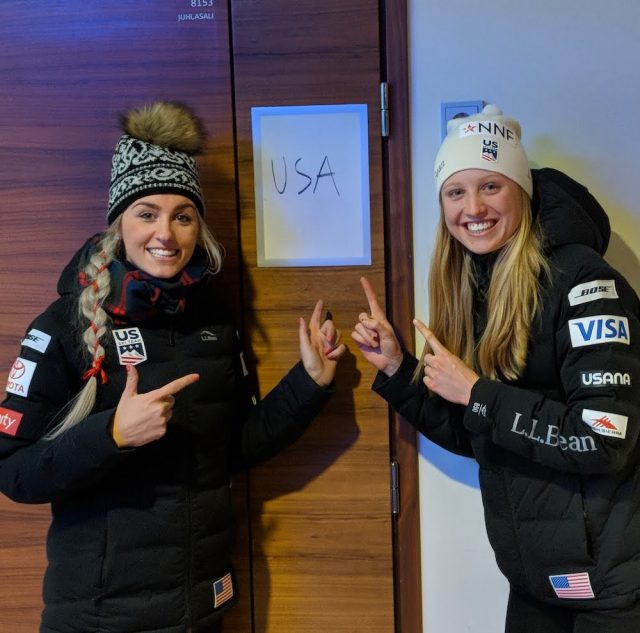
You alluded to a range of viewpoints here. With that in mind, how does your job description and what you’re doing on a daily basis relate to what this country’s club coaches are doing? How do you see your role, let’s say vis-à-vis club coaches – I don’t want to say “versus” because I assume it’s not antagonistic, but that said, how do you do your job as The National Team Coach when your athletes are clearly spending most of their time with their other coach in the club system?
My job is the opposite of “versus,” right. My role in this job is to do whatever it takes with the coaches that are making these athletes so phenomenal to lead, get out of the way, and advocate for the athlete’s best interest. And with each coach on a one-on-one basis and with the athletes and with their parents and with whoever else they’re working with that is enabling their success, making sure that that I’m walking into a room and I’m figuring out what they need, and I’m able to either meet that need, or be a resource who finds or links them with the person or the situation that’s going to enable that development. So I think more than anything that I do, my job is to help the athletes have the potential and opportunity to take skiing as far as they want to take it. It’s a little more I think of being a catalyst and an advocate, and somebody who’s able to communicate and link everyone together.
I think high-level sport – and really high-level anything, any craft, any art, any skill – you deal with people who have a ton of conviction, a lot of discipline, and big personalities, which often come with big egos.
There are so many coaches in this country, and so many athletes who believe in what they’re doing and are uncompromising on it. And I don’t know a single coach in this country, who’s super effective, who isn’t a bit polarizing, because they believe in what they’re doing, they’re not going to compromise on it, and they’re not going to let in distractions. My job is to work with those athletes and those coaches to make sure and to help put a system in place to — not just interpersonally in my role — but to put a system in place where there are really open doors of communication all the time. My job is to not be in the way, not be a barrier to open doors, and to make sure people know they are welcome to run through them at full speed.
I think we have six to eight “Jessie Digginses” in this country. Jessie is a really unique athlete. She’s obviously done a lot to maximize the potential she has. She has also had coaches who were moving on to the national team stage who knew her and provided continuity from the time that she was a club athlete. I would like to have that pathway, that system, and those open doors in place for more athletes, so that we can develop those versions of Jessie Diggins, those versions of Gus Schumacher, those versions of Kikkan Randall. So that that is something really deliberate we can identify and develop as a leading body in U.S. skiing, not an accident where we’re like, ‘Man, how do we do that again?’
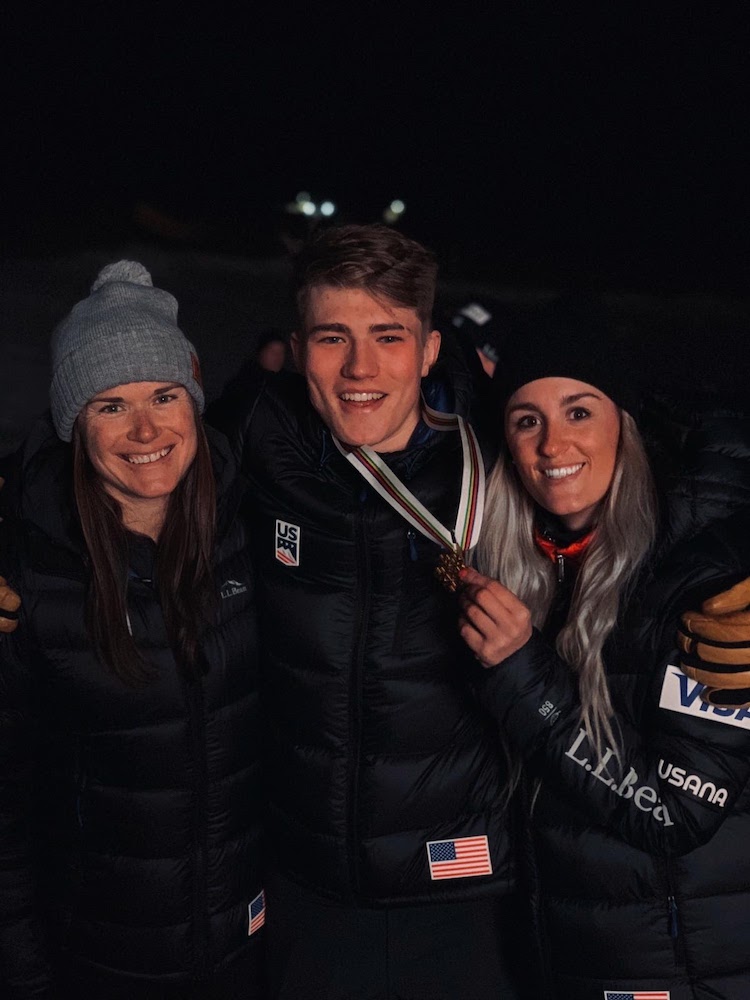
Speaking of identifying areas for success, what are some things that you think are currently strengths when it comes to junior skiing or development in this country, and what are some things that you think present areas for improvement?
So the thing I think we do the best of anybody is: we put our athletes in the driver’s seat.
So to use the [2019] boys relay team as an example, they hung this really big goal out there and said, “We want to win the gold medal in the relay.” And you, a little bit in those meetings, saw Bryan Fish’s eyes glaze over. And he was like, “Okay…” And I think the boys’ inspiration stemmed from the girls’ relay team success, in many ways, in Soldier Hollow, in 2017. And the boys said, ‘We want to do that.’
Whoa, huge goal. Scary. Achievable. Gonna take everybody on board, pitching in and being all-in and having a lot of buy-in throughout the process. And from the year that they won the silver medal, Hunter Wonders had aged out of that spot. And so we didn’t know who was going to fill that spot, necessarily, going into that week in Lahti [in 2019]. And I was standing next to a German coach during the relay – Johnny [Hagenbuch] ended up being our guy – and Johnny got tagged, and he started skiing the third leg. And the German coach said, ‘Oh, this is the least experienced one, he must be your weakest link, we’ll see what happens.’ And Germany had happened to put their strongest skier in the third leg, actually.
And I said – and I really meant this – I looked at him and I said, ‘Actually, he might be our strongest skier. Johnny’s our wild card; we haven’t seen him race like this yet.’
And everybody – all four of the guys in that race had their job, had their assigned task. And Johnny executed his perfectly. And he didn’t know if he was going to be the strongest athlete or the weakest one or whatever link, either. I think all four of those guys were so strong, I would put four of any of them on the start line and put my money on them.
And so I think the thing that we do really well in this country is we’ve put our athletes in the driver’s seat, and we have said, ‘Okay, what do you want to do with skiing, where do you want to take it?’ And we sit down as a team – and Bryan Fish has been really good about this, and so has Kate [Johnson, née Barton], and so has Bernie [Nelson] – and we sit down at the beginning of meetings, when the teams come together. Everybody checks their ego and walks into the room.
And a lot of people don’t know each other yet or have raced and sort of know each other, but not well, and they say, ‘Hey, what are the keywords? What do you want this team to be?’ I mean, people spitball. ‘I want it to be collaborative;’ ‘I want it to be fun;’ ‘I want it to be strong;’ ‘I want it to be inspiring.’ Okay, what does that mean to you? And we pick some concepts, and we write it down, and it gets sent out on a WhatsApp or whatever. And we go with that all week.
That’s huge ownership for the athletes, right? That is what do you want this team to be? And what are you going to bring to the table to make it happen? And what are you going to hold your teammates accountable for bringing to the table.
And I’ve been so impressed with every single one of our athletes at both World Juniors I’ve been to, and I’ve watched that ripple effect now filter through U16 camp, and you hear it in Simi Hamilton’s voice when he races his last race, and he says, ‘I’m so happy to be part of Gus’s process in the future, I’m so happy to be this part of U.S. men’s skiing,’ and I think that’s really cool.
So that’s what we do well. [As for an area for potential improvement,] we’re a big country; we’re spread out. We have a lot of people that know what they’re doing well, in their respective area. I think that we can do a better job moving forward of collaborating, as far as realizing that what works in the East is not going to work in the Far West and saying, ‘Well, both are turning out world-class, top-caliber athletes.’
That’s not a bad thing, right? That’s a really good thing. Because that means that if you have a certain personality type, and you happen to live in Colorado, but you would like to go to sea level and train, you can go to the Pacific Northwest and get really good training there. I think that’s pretty huge. That’s something that can be a weakness if we let it be, or we can turn it into a huge advantage for ourselves.
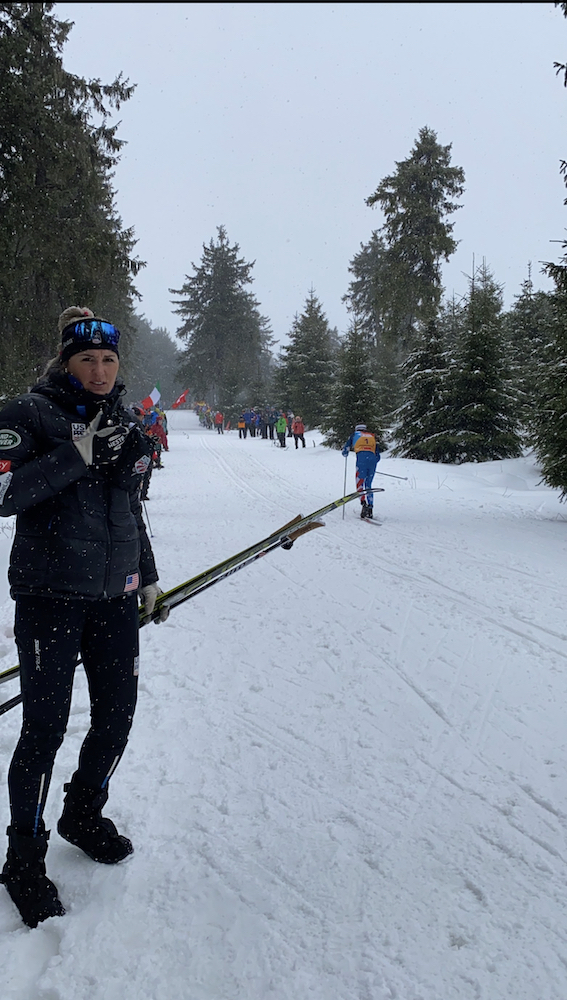
I jumped right into things here with your personal background, but I should really back up and ask you a little more about your job description. I hate to make you define your job by reference to someone else, but this spring when I saw the D-Team position being advertised for the third time in three years I frankly thought something rather uncharitable, roughly, ‘Oh man, yet another coach left after just another year, something bad must be going on over there.’ And I know that some other people involved in American skiing had a comparable reaction when they saw your job posting this spring, after Bernie was announced for this role in 2019 and then Kate last year.
I’ve since learned that Kate is in fact very much still with the program, so obviously these initial, somewhat negative conclusions were inaccurate and unfair on my part. That said, can you speak to not only what your job entails, but also how it complements Kate’s current role, given that she is also employed by the U.S. Ski Team and that on paper your job description looks basically identical to hers?
So every coach that’s been in the Nordic program, all people I have tremendous respect for, who are disrupting the industry in such a good way are coming to it – and I saw your list of questions, that you’re going to ask what my coaching philosophy, I am a complete student of the sport. So I try to come to it with confidence and humility. And say, ‘Here’s what I think I know, here’s what I definitely don’t know, here’s some people who can help me find out.’
And I think more than having really good answers, I view my role here as being able to ask really good questions, being able to work together with people. And being able to communicate when there are disconnects.
I’ve worked across a lot of programs now and in several regions. And so I feel – I know that’s something that energizes me coming to my job, the different challenge every day, and I’m really excited to stay on my toes and keep having those challenges, if you will.
Having said that, what I’m getting to in my longwinded way, is: the coaches that I will be working with, who include all of Jason Cork, Chris Grover, Matt Whitcomb, Kate Johnson, Bryan Fish – I’m Fish’s shadow, basically. So all of those, but especially Fish.
The job description for this job was three pages long. And it was the same as it was for Kate last year. And this is the thing with the ski team, I think with pitching in and being willing to do what needs to be done. It’s, “Do you see a need, can you fill it.” And all of those coaches, those five coaches that I’ll be working with, especially Fish, have created a niche for themselves within the job role. They filled the role that needs to be filled.
So Matt and Grover – we don’t have a men’s coach right now. We have a World Cup coach [Whitcomb] and a program director [Grover] who are motivated to work together and work with other coaches and work with techs to make sure that there’s no gaps on race day. And so what Kate did was, Kate took on this job that Bernie [Nelson] had done a tremendous job with in the nine months that she was with the program and then vacated. And Bernie had a tremendous impact – a tremendous impact; she was so well received and so effective so quickly.
And they were understaffed last year on the World Cup. Kate, who was over in Europe, ended up staying over in Europe and helping out with World Cup, and she did a tremendous job, and she carved out a little niche for herself and they love having her there.
What we used to have with the D-Team was these athletes that were racing the college circuit and the NorAm circuit and when they were ready to race up a few starts, they were racing up. We’re so fortunate, our future in this country with skiing is so bright, that our D-Team, our development team athletes, are ready to go on World Cup and they’re ready to score points. That means they need a coach there supporting that. That step, that Kate’s job role is changing, is showing our progress as a country in skiing.
And so Kate is going to be working internationally, she’s going to be on World Cup, she’s going to be continuing to work with the athletes in about the same capacity that she was last year, is my understanding. I am directly overseen by Bryan Fish. And Kate, Bryan, and I are going to work together pretty closely; Whitcomb’s going to tell us what he sees as successful at the World Cup level, and then I’m going to fill the gaps that need to be filled and try to carve out a little niche for myself. That’s going to look like whatever the team needs.

Mostly, I’ll be organizing Junior camps, organizing logistics of U16 camp, making sure we’re inviting the right athletes, we’re casting a wide enough net, we’re able to support those athletes. And we’re able to – and this is a big goal of mine, having worked at several clubs directly – able to keep parents looped in, so that all the cogs on the wheel are working in unison to make everything spin as quickly and smoothly as possible.
Can you give me an example of something that you would want parents to know or something that would be important to you, when you say that you want to make sure that the parents are looped in?
I’d say, ‘Nothing you say is going to be used against your child.’
The more that we know about their whole lives, the better. And I want parents to feel like if they call or email me, they’re going to get a call or email back.
I guess in a word, I want to be approachable, right? I want parents to feel like the national team at the development level is there to help them navigate, help their child navigate, the ins and outs of ski racing. The kids, as they become high-level athletes, pressure increases; the responsibilities they carry increase, even when they’re minors. There are skills they’re going to need to be able to develop to manage travel, to manage sleep, to manage their time, that I want parents and coaches and national team staff to work in unison to know what’s going on and to be able to help where we can.
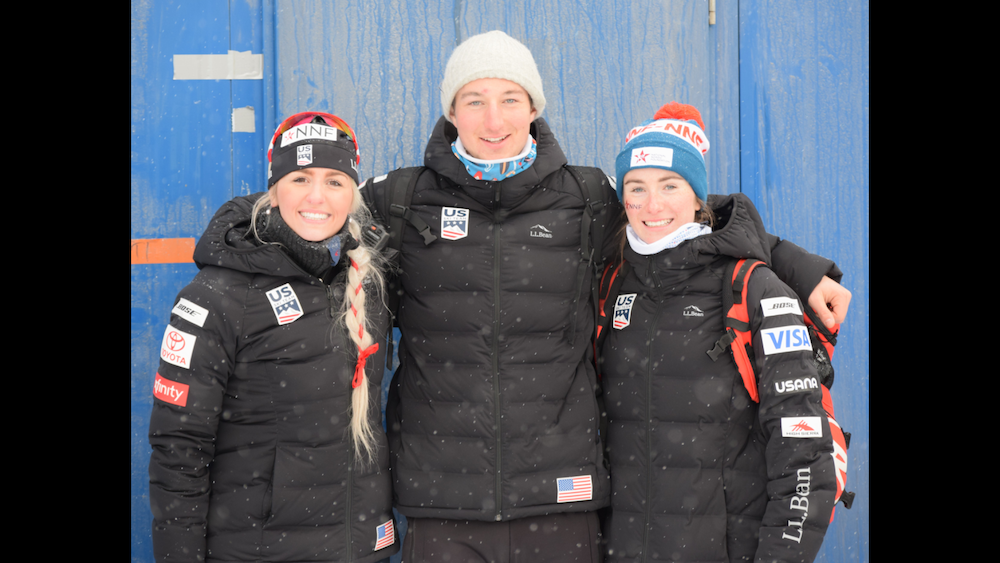
You just mentioned five or ten important skills that people need to be able to develop. At least at a facile level, none of them had anything to do with ski racing per se. Can you talk about that sense that maybe we’re talking about a whole person here rather than just “the athlete,” for lack of a better phrasing?
Happy people race fast. They train well, and they race for a really long time, long enough to develop. If you’re not happy in your life – I know Flora has the cup thing [“don’t overfill your cup,” discussed as the central metaphor of this article]. If you’re not happy in your life, you can win World Championships and there’s going to be a hole there. And what I want is to work with happy people who are really good friends; I want us to do what we can to make sure that ski racing is a really great part of these athletes’ lives and a part of their family’s lives. Not something they have to weigh against their happiness in order to enable.
But our athletes for the most part, the ones that I’ve seen, develop really well, stay in it, and are committed to it and are able to make it through injuries or tough times or years like Covid where things are very uncertain. When they have good support, and people to talk to and clarity, and they’re happy – or maybe that’s not the right word, but they find deep meaning in what they do.
I’ll tell you as a coach, I’ve wanted to be in a development role for a long time. Because I think what sport brings to us – you know this, you’re a master skier and you’re watching your girls grow up and start their first experience with sport outside of your home, right? It’s so deeply meaningful and such an important part of life that not a lot of other things can teach.
And so I guess that’s where my passion for this stems from. I coach the whole person; I want to work with the whole person, I don’t want to work with a piece of you. A world championship is most deeply meaningful when you share it, and so the image that comes to my mind when I say that is when Gus – Gus was the last finisher in that race [in Oberwiesenthal], or one of them. And when he finished the 10k that he won, there’s a picture of him hugging his mom. And in the background is Lin Hinderman, who came over with her husband just to watch the Alaskan kids and all the kids ski race because she’s been a FIS rep at Junior Nationals and watched all these kids. She’s a huge fan of skiing. She was, I think, the first women’s World Junior coach ever, working under John Estle, because he said, Lin can do this.
And then Matt Pauli was a chief of course, was on the jury there. Matt is an Anchorage resident, and I’ve known him for many years. And he is a huge fan of the sport. And it was them, and it was 12 different sets of parents from the United States. It was the Palmer-Legers, it was the Hagenbuches, Luke Jager’s dad came over for it, Greg Schumacher [Gus’s father] was our team doctor — everybody’s involved in this teeny, tiny piece. And what makes it meaningful are moments like those – and Gus said that, right? He was looking around and crying because he knows how much it means to the community.
And I think that’s – I want to take that community and on the race course, I want us to weaponize it to dominate the world.
And I think Kate’s vision is very similar. And she sent me a really nice text when I got hired and said, like, ‘Let’s take over the world together. Haha, kidding, but not really at all.’
I’m so proud of those athletes. And I’m as proud of them when they have to sit out a relay race and they’re just as happy for their teammates who are racing, as I am when they’re on the podium.
I want to ask you basically the same thing I asked Sadie earlier this spring. American skiing is currently at a very high level; results that would have been widely celebrated a decade ago sometimes don’t even get noticed now. This is a great problem to have, but it potentially still is a problem. What do you say to a 16-year-old junior who thinks if she’s not training 700 hours a year, or medaling at World Juniors, she’s a total failure. What do you say to a maybe not-very-hypothetical junior skier who in fact is doing everything right, at least for them, but who nonetheless thinks, ‘Oh my gosh, if I’m not reaching these impossibly high standards, either real ones or what I think I see from social media, I have no future in skiing’?
I say Rosie Frankowski, I say U16 Gus Schumacher, I say Holly Brooks.
[All three are, relatively speaking, late bloomers: Frankowski finished 44th at U.S. Nationals as a college skier, and 42nd after graduating, then went on to place 21st at the Olympics four years later; Schumacher finished 11th out of 26 in one U16 JOQ race; Brooks never qualified for NCAAs while skiing in college and once described her junior skiing results as, “I’m the girl from PNSA who always finished 40th” at JOs.]
[Relative to national-team athletes in local races] if you’re within four minutes of these guys at these races – and they hop in local races, and that’s unique to the U.S., and that is cool – you don’t go to World Juniors and wonder if you’re going to crack the top 30 that day anymore. You know. And so we have a really cool metric.
I absolutely understand what you’re saying, where the level is so high that maybe it seems discouraging. As adults and people with a lot of life experience, we look at Instagram and social media, and it gives us this skewed sense of all kinds of things, right – body image, finances, what people are up to on a day-to-day basis. Those things are going to keep happening. That’s our world now; at least currently; the only constant is change.
So how do we equip our junior athletes with the tools to handle things like that, the tools to handle those expectations, the tools to stick to what they’re doing, which is a good life skill, right? I can look around and see a bunch of other things that look rewarding, but I believe in this process, and I’m going to do it. I think as coaches, good coaches lead by example doing that. They believe in the training they’re doing, they’re not chasing hypotheticals, and I guess they have conviction, is the right word.
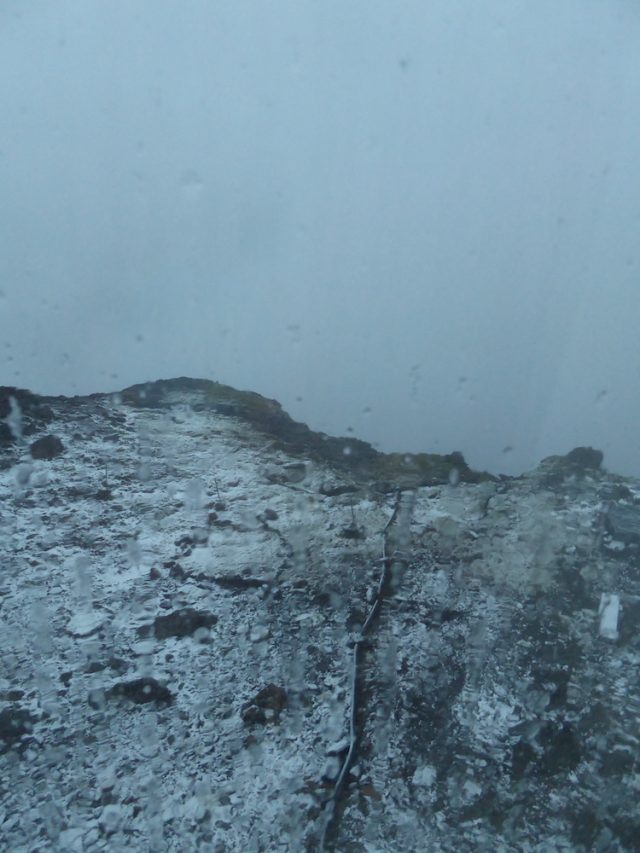
Are we giving them the tools to manage these unrealistic expectations, or these, ‘It’s sunny every day where I’m training.’ You well know that on Eagle Glacier, [according to social media] there are only pictures of sunny days, and everyone who has never been to Eagle Glacier thinks the sun shines there nonstop every day, and you can get the most wicked sunburn of your life.
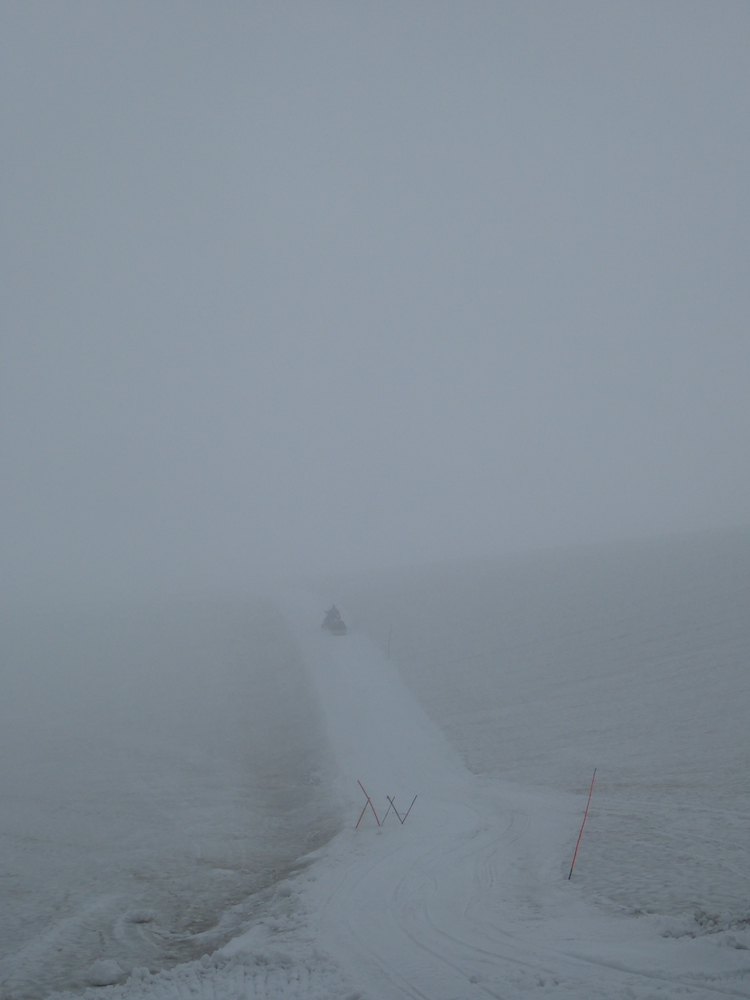
Because if you pull a camera out on Eagle Glacier on a normal day, your camera will be destroyed. And so a lot of times, we’re not looking at the people putting their head down and putting in the work, because we just see the outcome.
I would like to make more people aware in this communication, as a coach, of the hard work, dedication, and sweat equity. Okay, do you want to wear that jacket? Do you want to wear that suit? Or do you want to put your head down and do intervals on Saturday morning, which means that you couldn’t be up late on Friday night? Do you really want to do that? Are you dedicated to that?
And that’s not a question of opting out, that’s as a coach saying, here’s what it takes, opt in. Because at this point in the U.S., if you opt in, as coaches, and I really believe this, we can get you there. We say as coaches, ‘You have to give us 110% of your effort.’ If we as coaches are only giving 98% of our effort, or attention, or we’re only giving 70%, or we’re not keeping up on research, we’re not paying attention and we are complacent – in business, that’s called fraud.
So if I say as an athlete, ‘You have to give me 110%, and I’m going to do the best I can with everything within my power to make you a world champion.’ If you follow this plan, and I give you anything less than my absolute best, that’s not integrity. That’s not how champions are made.
I want us to have a system in place in this country where we can tell athletes, ‘We know these are the benchmarks. We know that this is what it takes. We know we can’t make guarantees. But these are the things that, if you do these things, we’re as sure as we can be within our control, that you can be really successful at this.’ And maybe you don’t win a world championship, but you carry those skills over into your life, and you will be successful applying those skills at anything you do. You have a chance to have meaning in your life, and you have a chance to be happy. And that’s a philosophy, that’s an idea, that’s a concept that I really believe in. I believe that for sure.
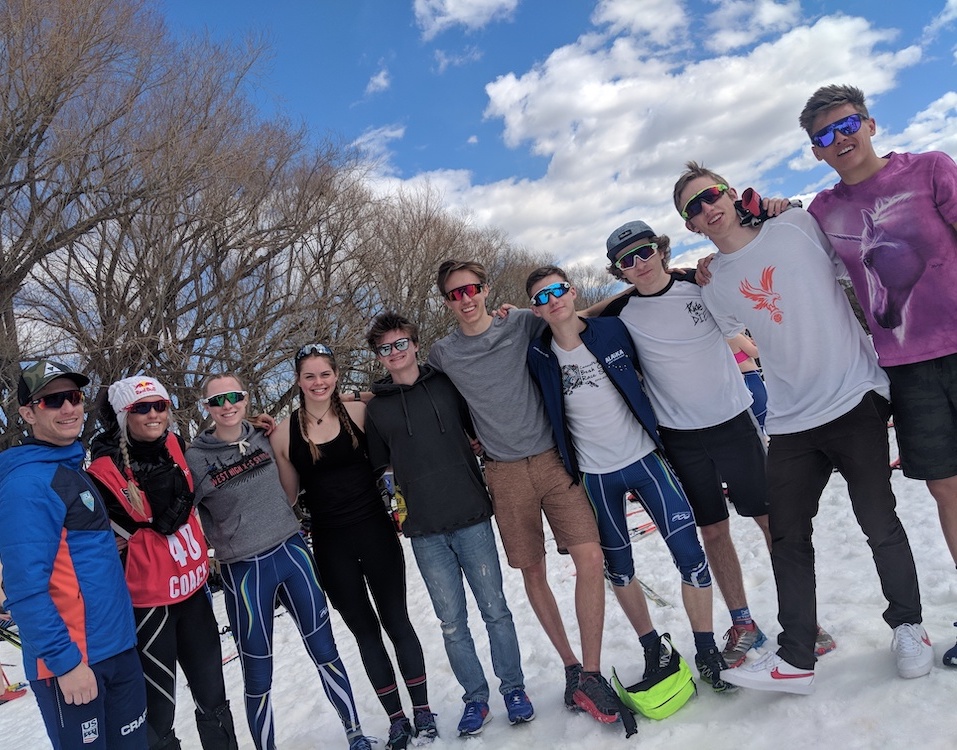
You’re obviously giving up your current coaching job with Alaska Winter Stars to move into this U.S. Ski Team role. I saw you at Kincaid last night, surrounded by Winter Stars juniors, all of whom adore you. Are you going to miss your current athletes?
Yes. I love coaching. I miss every job I have – every time I’ve moved into a new job, new role, I have missed what I have departed from. Having said that, and this is a strength I think I have as a coach, I’m pretty good at maintaining that rapport. I have great friends that I’ve worked with since my first year coaching and I feel like we can pick up where we left off and maintain those relationships.
Coaching is people, and you have to give more than a small afterthought about people; you have to really care about people as people in order to take a step toward first being an effective coach. That is a foundational aspect of being a coach.
Anything else?
I’m really thrilled to be doing this. I’m so excited to start collaborating with a lot of coaches in this country that I think are absolutely brilliant.
Gavin Kentch
Gavin Kentch wrote for FasterSkier from 2016–2022. He has a cat named Marit.

